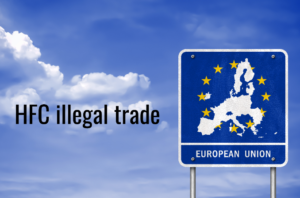ILLEGAL TRADE ROUND-UP – APRIL 2021
In this round-up: Data released in February 2021 about the potential magnitude of the illegal market in HFCs continues to be widely reported; Reports to the EFCTC Action Line of illegal HFC trade lead to criminal investigations; EFCTC issues brief note on T1 transit process in illegal trade; UNEP OzonAction technical brief states refrigerant labelling legislation helps prevent illegal trade; Seizures of illegal refrigerant in Romania and 2020 saw the largest seizures of illegal HFCs ever in the EU.
The February EFCTC study “New data: EU F-gas black market still impacts climate change” has been widely reported in the technical press and newspapers, see Stop illegal cooling - EFCTC, and for example LaRFP.
Reports to the EFCTC Action Line of illegal HFC trade lead to criminal investigations. Illegal trade in hydrofluorocarbons (HFCs) is threatening legitimate small businesses, financing organised crime, and ultimately the climate. The European FluoroCarbons Technical Committee (EFCTC) Action Line in 2020 received 111 anonymous reports of suspicious behaviour, leading directly to criminal investigations. More detail about the process and results is in the press release.
EFCTC issues position paper “brief note on T1 transit process in illegal trade”. The T1 Transit process is designed to facilitate the transportation of non-EU goods to its final destination, either in the EU or a non-EU member state. EFCTC believes that the T1 Transit procedure is being misused and exploited to enable illegal trade in HFCs in the EU. Read the position paper here.
The UNEP OzonAction technical brief “Labelling Refrigerant Cylinders: Why Set Up National Legislation on Labelling Refrigerant Cylinders?” The brief states that countries allowing the import or placing on the market of refrigerant cylinders without labelling, with incomplete or with misleading labelling might not be able to ensure the health and safety of users. They might also face challenges
in monitoring and controlling trade in controlled substances as required by the Montreal Protocol. It adds that labelling facilitates monitoring of trade in refrigerants. Setting up legislation on the labelling of refrigerant cylinders supports the Montreal Protocol objectives as it helps distinguish between controlled, exempted, and non-controlled substances, facilitates the prevention of illegal trade, and provides an indication of the environmental properties of the controlled substances.
Seizures of illegal HFCs
- ROMANIA: 9 tonnes of refrigerant, some labelled as R-404A in 1300 cylinders were seized by Romanian authorities. The truck carrying the cylinders had arrived from Turkey. See Cooling Post.
- In the EFCTC press release on the black market, Ville Itälä, Director-General of OLAF, said: “We are happy to see that the EU’s increased enforcement efforts since 2019 are clearly visible in the data. However, from our experience the black market is still a huge challenge. 2020 saw the largest seizures of illegal HFCs ever. At peak times, we alerted member states of illegal shipments on a daily basis. When a shipment is stopped somewhere, we often observe a decrease in illegal activity in that member state, with smugglers using different routes to get into the EU.

Image: ©Shutterstock/Cefic